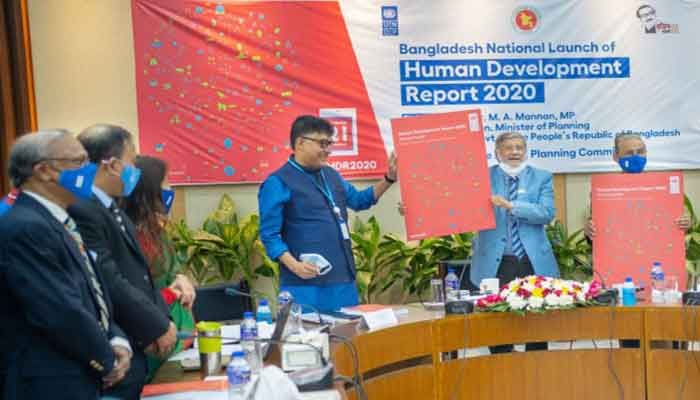
Desk Report
Publish: 21 Dec 2020, 02:27 pm

As the COVID-19 pandemic is the current epidemic facing the world, a recent study released internationally by the United Nations Development Program (UNDP) warns that unless humans loosen their hold on nature, it will not be the last.
The Human Development Report (HDR) 2020 entitled The Next Frontier: Human Development and Anthropocene, released in Bangladesh on 21 December 2020, six days after the global launch, contains a new experimental human progress index, said the UNDP on Monday.
The 30th Anniversary Edition of the report, the HDI, which typically measures the health, education and living standards of a nation, has been adjusted to include two additional elements: the carbon dioxide emissions of a country and its material footprint.
The adjustment now demonstrates how the global climate of development would change if human well-being and the earth were central to the idea of human advancement.
For example, more than 50 countries have fallen out of the very high human development group, reflecting their dependence on fossil fuels and their material footprint.
“As this report shows, no country in the world has yet achieved very high human development without putting immense strain on the planet. But we could be the first generation to right this wrong. That is the next frontier for human development,” said Achim Steiner, UNDP Administrator, during the global launch
On the other hand, Bangladesh moved up two notches in the traditional HDI to 133 compared to last year.
However, it remains fifth among the eight South Asian countries covered in the report but bounced up nine notches in the new planetary pressures-adjusted human development index (PHDI).
"Despite numerous challenges, Bangladesh is committed to nourishing the health of our planet, and working towards building a "Shonar Bangla," as envisioned by the Father of our Nation," said Planning Minister MA Mannan, who unveiled the report in Bangladesh.
"The strain on our planet mirrors the strain facing many of our societies. Climate change, among other dangerous planetary changes, will only make them worse," he also added.
UNDP Bangladesh's Resident Representative, Sudipto Mukerjee, pointed out that the Coronavirus pandemic's collateral costs far outweigh the loss of lives.
"To name a few of the obvious, such as a large number of people pushed into poverty due to lost livelihoods, increased inequalities, increased gender-based violence, increased risks of having a large proportion of children and youth dropping out of education, etc.," Sudipto pointed out.
"Scientists have been warning of a pandemic like this for years, as a reflection of the pressures people put on Planet Earth," he continued.
“HDR 2020 points out that our future is not about choosing between people or trees. It's about choosing to do things differently."
"Choices that could stop the pandemic and end poverty, close the digital divide, and tackle the climate emergency so that we use this unique moment in time to move to the next frontier for people and planet," he said, calling for increased cooperation for a better future.
The launch included a presentation detailing on the new PHDI by Balazs Hovarth, Senior Economic Advisor, UNDP Asia Pacific.
Following the launching, a panel discussion was held participated by Prof. Shamsul Alam, Senior Secretary, GED, Planning Commission; Prof. Saleemul Huq, Climate Scientist, Director ICCAD; Dr Fahmida Khatun, Executive Director, Centre for Policy Dialogue; Dr Samia Huq, Anthropologist, Dean of General Studies, BRAC University; and Ar. Iqbal Habib, Architect and Environmentalist. Mr Shahidul Haque, Former Senior Secretary, Foreign Affairs, moderated the discussion.
The report states that Bangladesh has made impressive strides in human development. Between 1990 and 2019, Bangladesh's HDI value has increased by 60.4 percent.
Bangladesh's 2019 HDI is above the average for countries in the medium human development group.
Between 1990-2019, Bangladesh's life expectancy at birth increased by 14.4 years, mean years of schooling increased by 3.4 years, and expected years of schooling increased by 6.0 years. Bangladesh's GNI per capita also increased by about 220.1 percent between 1990 and 2019.
Subscribe Shampratik Deshkal Youtube Channel
© 2024 Shampratik Deshkal All Rights Reserved. Design & Developed By Root Soft Bangladesh